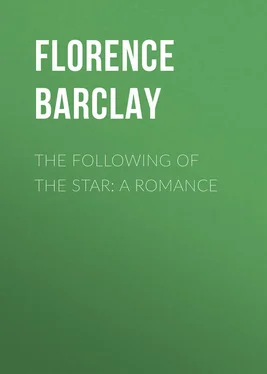Florence Barclay - The Following of the Star - A Romance
Здесь есть возможность читать онлайн «Florence Barclay - The Following of the Star - A Romance» — ознакомительный отрывок электронной книги совершенно бесплатно, а после прочтения отрывка купить полную версию. В некоторых случаях можно слушать аудио, скачать через торрент в формате fb2 и присутствует краткое содержание. Жанр: foreign_antique, foreign_prose, на английском языке. Описание произведения, (предисловие) а так же отзывы посетителей доступны на портале библиотеки ЛибКат.
- Название:The Following of the Star: A Romance
- Автор:
- Жанр:
- Год:неизвестен
- ISBN:нет данных
- Рейтинг книги:4 / 5. Голосов: 1
-
Избранное:Добавить в избранное
- Отзывы:
-
Ваша оценка:
- 80
- 1
- 2
- 3
- 4
- 5
The Following of the Star: A Romance: краткое содержание, описание и аннотация
Предлагаем к чтению аннотацию, описание, краткое содержание или предисловие (зависит от того, что написал сам автор книги «The Following of the Star: A Romance»). Если вы не нашли необходимую информацию о книге — напишите в комментариях, мы постараемся отыскать её.
The Following of the Star: A Romance — читать онлайн ознакомительный отрывок
Ниже представлен текст книги, разбитый по страницам. Система сохранения места последней прочитанной страницы, позволяет с удобством читать онлайн бесплатно книгу «The Following of the Star: A Romance», без необходимости каждый раз заново искать на чём Вы остановились. Поставьте закладку, и сможете в любой момент перейти на страницу, на которой закончили чтение.
Интервал:
Закладка:
"But Emmanuel was His mother's name for Him. As she laid him in the manger, round which the patient cattle snuffed in silent wonder at this new use for the place where heretofore they munched their fodder, it was ' God with us' in the stable.
"As, seated on the ass, she clasped the infant to her breast through the long hours of that night ride into Egypt, she whispered: 'Emmanuel, Emmanuel! God with us, in our flight and peril.'
"In the carpenter's home at Nazareth, where, in the midst of the many trials and vexations of a village life of poverty, He was ever patient, gentle, understanding; subject to His parents, yet giving His mother much cause for pondering, many things to treasure in her heart – often, in adoring tenderness, she would whisper: 'Emmanuel, God with us .'"
David paused and looked earnestly down the church, longing for some response to the thrill in his own soul.
"Ah," he said, slowly and impressively, "if only the boys in your village could be this to their mothers! If their loyal obedience, their gentle, loving chivalry, their thoughtful tenderness, could make it possible for their own mothers to say: 'I see the Christ-life in my little boy. When he is at home, the love of God is here. Truly it is Emmanuel, God with us.'"
"What did that young man mean," remarked Mrs. Smith at the dinner-table at Appledore Farm, "by trying to take from us the name 'Emmanuel'? Seems to me, if he stays here much longer we shall have no Bible left!"
Mr. Churchwarden Smith had been carving the Sunday beef for his numerous family. He had only, that moment, fallen to, upon his own portion. Otherwise Mrs. Smith would not have been allowed to complete her sentence.
"I've no patience with these young chaps!" he burst out, as soon as speech was possible. "Undermining the faith of their forefathers; putting our good old English Bible into 'Ebrew and Greek, just to parade their own learning, and confuse the minds of simple folk. 'Higher criticism,' they call it! Jolly low-down impudence, say I!"
Mrs. Smith watchfully bided her time. Then: "And popish too," she added, "to talk so much about the mother of our Lord."
"I don't think he mentioned her , my dear," said Mr. Churchwarden Smith. "Pass the mustard, Johnny."
Yes, as he thought it over during his lonely luncheon, David felt more and more convinced that his morning sermon had been a failure.
He did not know of a little curly-headed boy, whose young widowed mother was at her wit's end as to how to control his wilfulness; but who ran straight to his garret-room after service, and, kneeling beside his frosty window, looked up to the wintry sky and said: "Please God, make me a Manuel to my mother, like Jesus was to His, for Christ's sake, Amen."
David did not know of this; nor that, ever after, that cottage home was to be transformed, owing to the living power of his message.
So, down in the depths of discouragement, he dubbed his morning sermon a failure.
Notwithstanding, he prepared the evening subject with equal care, a spice of enjoyment added, owing to the fact that he would possibly – probably – almost to a certainty – have in the evening congregation a mind able to understand and appreciate each point; a mind of a calibre equal to his own; a soul he was bent on winning.
As he closed his Bible, put it into his pocket, and relaxed over the thought that his sermon was complete, he smiled into the glowing wood fire, saying to himself, in glad anticipation: "My Lady of Mystery will undoubtedly be there. Now I wonder if she believes that there were three Wise Men!"
CHAPTER II
THE LADY OF MYSTERY
David thrust his hands deep into the pockets of his short coat, well cut, but inclined to be somewhat threadbare. He crossed his knees, and lay back comfortably in the Rector's big chair. An hour and a half remained before he need start out.
It was inexpressibly restful to have his subject, clear cut and complete, safely stowed away in the back of his mind, and to be able to sit quietly in this warmth and comfort, and let his thoughts dwell lightly upon other things, while Christmas snow fell softly, in large flakes, without; and gathering twilight slowly hushed the day to rest.
"Yes, undoubtedly my Lady of Mystery will be there," thought David Rivers, "unless this fall of snow keeps her away."
He let his memory dwell in detail upon the first time he had seen her.
It happened on his second Sunday at Brambledene.
The deadening effect of the mental apathy of the congregation had already somewhat damped his enthusiasm.
It was so many years since he had preached in English, that, on the first Sunday, he had allowed himself the luxury of writing out his whole sermon. This plan, for various reasons, did not prove successful.
Mrs. Churchwarden Jones and Mrs. Churchwarden Smith – good simple souls both, if you found them in their dairies making butter, or superintending the sturdy maids in the farm kitchens – seemed to consider on Sundays that they magnified their husbands' office by the amount of rustle and jingle they contrived to make with their own portly persons during the church services. They kept it up, duet fashion, on either side of the aisle. If Mrs. Jones rustled, Mrs. Smith promptly tinkled. If Mrs. Smith rustled, Mrs. Jones straightway jingled. The first time this happened in the sermon, David looked round, hesitated, lost his place, and suffered agonies of mortification before he found it again.
Moreover he soon realised that, with his eyes on the manuscript, he had absolutely no chance of holding the attention of his audience.
In the evening he tried notes, but this seemed to him neither one thing nor the other. So on all subsequent Sundays he memorised his sermons as he prepared them, and hardly realised himself how constantly, in their delivery, there flowed from his subconsciousness a depth of thought, clothed in eloquent and appropriate language, which had not as yet been ground in the mill of his conscious mind.
On that second Sunday evening, David had entered the reading-desk depressed and discouraged. In the morning he had fallen out with the choir. It was a mixed choir. Large numbers of young Smiths and Joneses sat on either side of the chancel and vied with one another as to which family could outsing the other. This rivalry was resulting in a specially loud and joyful noise in the closing verses of the Benedictus.
David, jarred in every nerve, and forgetting for the moment that he was not dealing with his African aborigines, wheeled round in the desk, held up his hand, and said: "Hush!" with the result that he had to declaim the details of John the Baptist's mission, as a tenor solo; and that the organist noisily turned over his music-books during the whole time of the sermon, apparently in a prolonged search for a suitable recessional voluntary.
Wishing himself back in his African forests, David began the service, in a chastened voice, on that second Sunday evening.
During the singing of the first of the evening psalms the baize-covered door, at the further end of the church, was pushed gently open; a tall figure entered, alone; closed the door noiselessly behind her, and stood for a moment, in hesitating uncertainty, beneath the gallery.
Then the old clerk and verger, Jabez Bones, bustled out of his seat, and ushering her up the centre, showed her into a cushioned pew on the pulpit side, rather more than half-way up the church.
The congregation awoke to palpable interest, at her advent. The choir infused a tone of excitement into the chant, which, up to that moment, had been woefully flat. Each pew she passed, in the wake of old Jabez, thereafter contained a nudge or a whisper.
David's first impression of her, was of an embodiment of silence and softness, – so silently she passed up the church and into the empty pew, moving to the further corner, right against the stout whitewashed pillar. No rustle, no tinkle, marked her progress; only a silent fragrance of violets. And of softness – soft furs, soft velvet, soft hair; and soft grey eyes, beneath the brim of a dark green velvet hat.
Читать дальшеИнтервал:
Закладка:
Похожие книги на «The Following of the Star: A Romance»
Представляем Вашему вниманию похожие книги на «The Following of the Star: A Romance» списком для выбора. Мы отобрали схожую по названию и смыслу литературу в надежде предоставить читателям больше вариантов отыскать новые, интересные, ещё непрочитанные произведения.
Обсуждение, отзывы о книге «The Following of the Star: A Romance» и просто собственные мнения читателей. Оставьте ваши комментарии, напишите, что Вы думаете о произведении, его смысле или главных героях. Укажите что конкретно понравилось, а что нет, и почему Вы так считаете.











